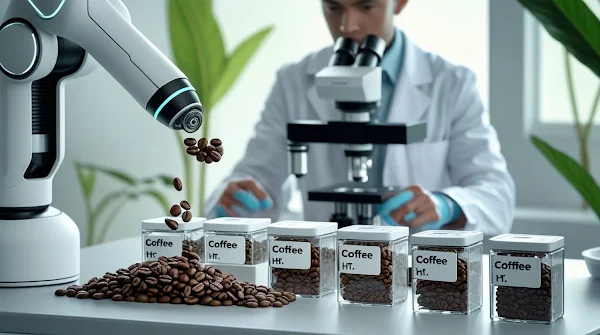What if your morning coffee didn't come from Colombian beans but from a Seattle lab?
Welcome to the era of beanless coffee. As global coffee consumption continues to rise, food technology is revolutionizing our cups. Between environmental promises and marketing buzz, synthetic coffee intrigues as much as it divides.
1. When Food Tech Reinvents Coffee
For several years, startups have been betting on beanless coffee - a lab-grown alternative that replicates the taste, aroma and texture of traditional coffee without plantations.
One American startup has particularly made waves by developing molecular coffee without coffee plants. The idea? Using recycled ingredients and bio-identical compounds to create a brew similar to traditional coffee... without relying on conventional supply chains.
But they're not alone: other sustainable foodtech companies are exploring this next-generation beverage's potential, aiming to offer an alternative that's:
- More ecological
- Less climate-dependent
- More controlled
2. Ecological Solution or Displaced Problem?
Traditional coffee's environmental impact is heavy:
- Deforestation
- Excessive water consumption
- Transportation emissions
- Precarity of small producers
Synthetic coffee promises to drastically reduce this footprint:
- Less land used
- No pesticides needed
- Urban production possible
But beware: Producing lab-grown coffee requires energy, materials, and still-evolving technology. Some experts wonder: are we just moving the problem rather than solving it?
3. Between Fascination and Skepticism: Public Perception
Opinions are divided:
| Pro | Con |
|---|---|
| Curious consumers | Coffee purists |
| Drawn to innovation | Reject lack of terroir |
| Environmentally conscious | Criticize missing history |
Professionals remain cautious. Some roasters see it as a threat to traditional systems. Others already envision coexistence between traditional and high-tech coffee, similar to what we see today with plant-based and cultured meat.
4. Coffee's Future: Innovation or Disconnection?
Coffee is more than a drink: it's a cultural, sensory, and social ritual. Can we truly recreate this magic in a lab?
The future might lie in balance:
- Preserving authenticity for enthusiasts
- Offering sustainable alternatives
- Using technology as complement
Conclusion: Between Science and Caffeine, the Debate is On
Beanless coffee isn't just a marketing gimmick. It reflects a broader transformation: rethinking our food systems facing climate and economic challenges.
But this revolution raises questions about taste, meaning, and transparency.
So is synthetic coffee a real solution or cleverly marketed illusion?
👉 Would you drink beanless coffee?
💬 Tell us in the comments and share this article if it made you think.










0 Comments
Leave a Comment!
We love hearing your thoughts and sharing coffee experiences. Whether you have questions, suggestions, or just want to chat about your latest cup, feel free to leave us a message!
Your Name
Your Email
Your Comment
We’ll get back to you as soon as possible. Thanks for being part of our coffee journey!